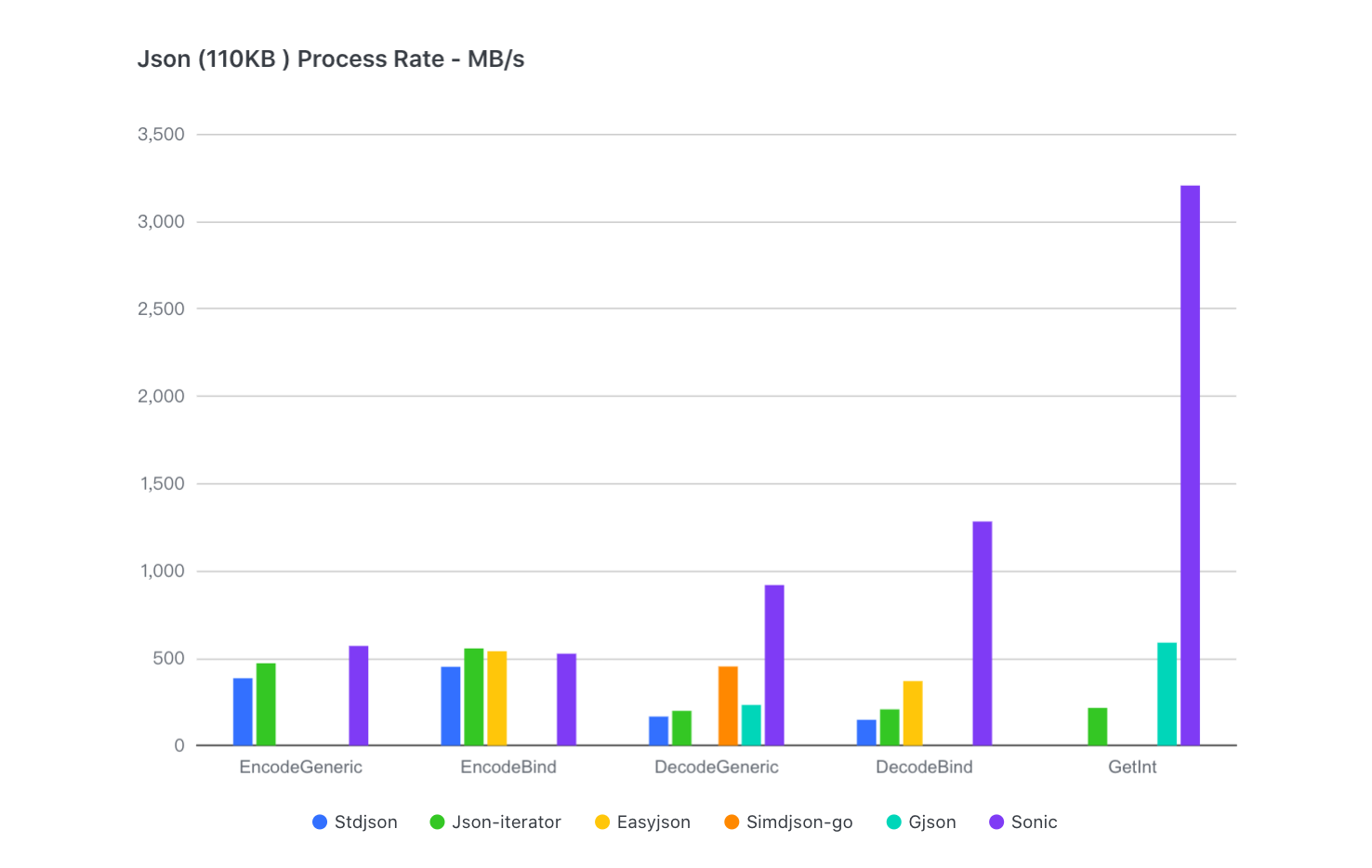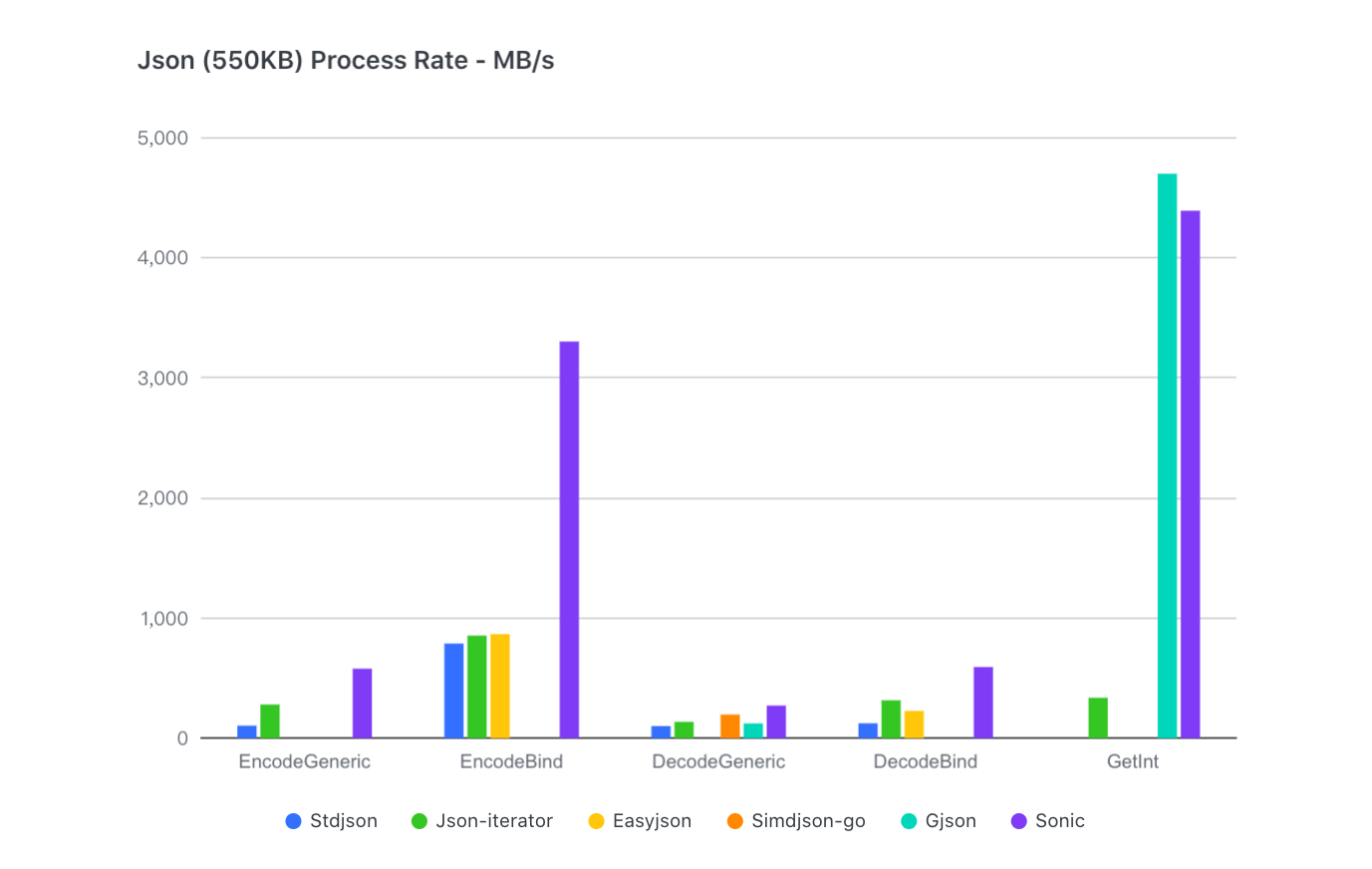A blazingly fast JSON serializing & deserializing library, accelerated by JIT(just-in-time compiling) and SIMD(single-instruction-multi-data).
For all sizes of json and all scenes of usage, Sonic performs almost best.
- Small (400B, 11 keys, 3 levels)

- Medium (110KB, 300+ keys, 3 levels, with many quoted-json values)

- Large (550KB, 10000+ key, 6 levels)

For a 13KB TwitterJson(cpu i9-9880H, goarch amd64), Sonic is 1.5x faster than json-iterator in decoding, 2.5x faster in encoding.
BenchmarkDecoder_Generic_Sonic-16 10000 54309 ns/op 240.01 MB/s 46149 B/op 303 allocs/op
BenchmarkDecoder_Generic_StdLib-16 10000 135268 ns/op 96.36 MB/s 50899 B/op 772 allocs/op
BenchmarkDecoder_Generic_JsonIter-16 10000 96701 ns/op 134.80 MB/s 55791 B/op 1068 allocs/op
BenchmarkDecoder_Binding_Sonic-16 10000 29478 ns/op 442.20 MB/s 26062 B/op 34 allocs/op
BenchmarkDecoder_Binding_StdLib-16 10000 119348 ns/op 109.22 MB/s 10560 B/op 207 allocs/op
BenchmarkDecoder_Binding_JsonIter-16 10000 37646 ns/op 346.25 MB/s 14673 B/op 385 allocs/op
BenchmarkEncoder_Generic_Sonic-16 10000 25894 ns/op 503.39 MB/s 19096 B/op 42 allocs/op
BenchmarkEncoder_Generic_JsonIter-16 10000 50275 ns/op 259.27 MB/s 13432 B/op 77 allocs/op
BenchmarkEncoder_Generic_StdLib-16 10000 154901 ns/op 84.15 MB/s 48173 B/op 827 allocs/op
BenchmarkEncoder_Binding_Sonic-16 10000 7373 ns/op 1768.04 MB/s 13861 B/op 4 allocs/op
BenchmarkEncoder_Binding_JsonIter-16 10000 23223 ns/op 561.31 MB/s 9489 B/op 2 allocs/op
BenchmarkEncoder_Binding_StdLib-16 10000 19512 ns/op 668.07 MB/s 9477 B/op 1 allocs/opMore detail see ast/search_test.go, decoder/decoder_test.go, encoder/encoder_test.go,
The behaviors are mostly consistent with encoding/json, except some uncommon escaping and key sorting (see issue4)
import "github.com/bytedance/sonic"
// Marshal
output, err := sonic.Marshal(&data)
// Unmarshal
err := sonic.Unmarshal(input, &data) Search partial json by given pathes, which must be non-negative integer or string or nil
import "github.com/bytedance/sonic"
input := []byte(`{"key1":[{},{"key2":{"key3":[1,2,3]}}]}`)
// no path, returns entire json
root, err := sonic.Get(input)
raw := root.Raw() // == string(input)
// multiple pathes
root, err := sonic.Get(input, "key1", 1, "key2")
sub := root.Get("key3").Index(2).Int64() // == 3Returned ast.Node supports:
- secondary search:
Get(),Index(),GetByPath() - type assignment:
Int64(),Float64(),String(),Number(),Bool(),Map(),Array() - children traversal:
Values(),Properties() - supplement:
Set(),SetByIndex(),Add(),Cap(),Len()
import "github.com/bytedance/sonic/decoder"
input := `1`
var data interface{}
// default float64
dc := decoder.NewDecoder(input)
dc.Decode(&data) // data == float64(1)
// use json.Number
dc = decoder.NewDecoder(input)
dc.UseNumber()
dc.Decode(&data) // data == json.Number("1")
// use int64
dc = decoder.NewDecoder(input)
dc.UseInt64()
dc.Decode(&data) // data == int64(1)
root, err := sonic.GetFromString(input)
// Get json.Number
jn := root.Number()
jm := root.InterfaceUseNumber().(json.Number) // jn == jm
// Get float64
fn := root.Float64()
fm := root.Interface().(float64) // jn == jmSince Sonic uses JIT(just-in-time) compiling for decoder/encoder, huge schema may cause request-timeout. For better stability, we suggest to use Pretouch() for more-than-10000-field schema(struct) before Marshal()/Unmarshal().
import (
"reflect"
"github.com/bytedance/sonic"
)
func init() {
var v HugeStruct
err := sonic.Pretouch(reflect.TypeOf(v))
}For alignment to encoding/json, we provide API to pass []byte as arguement, but the string-to-bytes copy is conducted at the same time considering safety, which may lose performance when origin json is huge. Therefore, you can use UnmarshalString, GetFromString to pass string, as long as your origin data is string or nocopy-cast is safe for your []byte.
Get() overlapping pathes from the same root may cause repeating parsing. Instead of using Get() several times, you can use parser and searcher together like this:
import "github.com/bytedance/sonic"
root, err := sonic.GetByString(_TwitterJson, "statuses", 3, "user")
a = root.GetByPath( "entities","description")
b = root.GetByPath( "entities","url")
c = root.GetByPath( "created_at")No need to worry about the overlaping or overparsing of a, b and c, because the inner parser of their root is lazy-loaded.
In most cases of fully-load generic json, Unmarshal() performs better than ast.Loads(). But if you only want to search a partial json and convert it into interface{} (or map[string]interface{}, []interface{}), we advise you to combine Get() and Unmarshal():
import "github.com/bytedance/sonic"
node, err := sonic.GetByString(_TwitterJson, "statuses", 3, "user")
var user interface{}
err = sonic.UnmarshalString(node.Raw(), &user)